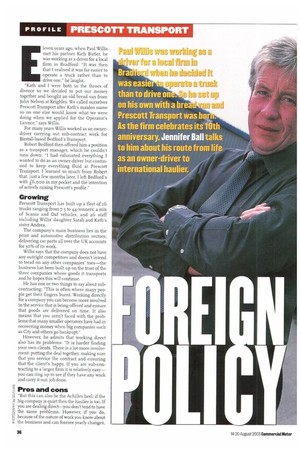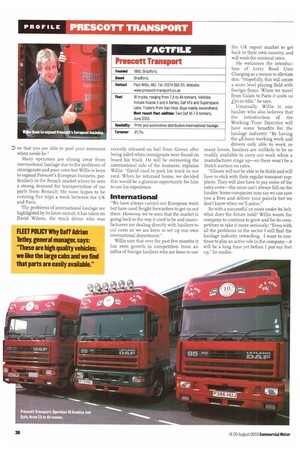E leven years ago, when Paul Willis met his partner Kath Butler, he was working as a driver for a local
Page 36

Page 38

If you've noticed an error in this article please click here to report it so we can fix it.
firm in Bradford: "It was then that I realised it was far easier to operate a truck rather than to drive one," he laughs.
"Kath and I were both in the throes of divorce so we decided to put our money together and bought an old bread van from John Nelson at Keighley. We called ourselves Prescott Transport after Kath's maiden name so no one else would know what we were doing when we applied for the Operator's Licence," says Willis.
For many years Willis worked as an ownerdriver carrying out sub-contract work for Birstall-based Bedford's Transport.
Robert Bedford then offered him a position as a transport manager, which he couldn't turn down: "I had exhausted everything I wanted to do as an owner-driver but continued to keep everything fluid at Prescott Transport. I learned so much from Robert that, just a few months later, I left Bedford's with i6,000 in my pocket and the intention of actively raising Prescott's profile."
Growing
Prescott Transport has built up a fleet of 16 trucks ranging from 7.5 to 44-tonners; a mix of Scania and Daf vehicles, and 26 staff including Willis' daughter Sarah and Kath's sister Andrea.
The company's main business lies in the print and automotive distribution sectors; delivering car parts all over the UK accounts for 30% of its work.
Willis says that the company does not have any outright competitors and doesn't intend to tread on any other companies' toes—the business has been built up on the trust of the three companies whose goods it transports and he hopes this will continue.
He has one or two things to say about subcontracting: "This is often where many people get their fingers burnt Working directly for a company you can become more involved in the service that is being offered and ensure that goods are delivered on time. It also means that you aren't faced with the problems that many smaller operators have had in recovering money when big companies such as City and others go bankrupt."
However, he admits that working direct also has its problems: "It is harder finding your own clients. There is a lot more involvement: putting the deal together, making sure that you service the contract and ensuring that the client's happy. If you are sub-con. tracting to a larger firm it is relatively easy— you can ring up to see if they have any work and carry it out: job done.
Pros and cons
8 "But this can also be the Achilles heel; if the .8' big company is quiet then the haulier is too. If ,s= you are dealing direct—you don't tend to have ;z the same problems. However, if you do,
because of the nature of work you know about the business and can foresee yearly changes
n so that you are able to pool your resources when needs be."
Many operators are shying away from international haulage due to the problems of immigrants and poor rates but Willis is keen to expand Prescott's European business, particularly in the French market where he sees a strong demand for transportation of car parts from Renault. He soon hopes to be running five trips a week between the UK and Paris.
The problems of international haulage are highlighted by its latest recruit; it has taken on David Wilson, the truck driver who was recently released on bail from Greece after being jailed when immigrants were found on board his truck. He will be overseeing the international side of the business, explains Willis: "David used to park his truck in our yard. When he returned home, we decided this would be a glorious opportunity for him to use his experience.
International
"We have always carried out European work but have used freight forwarders to get us out there. However, we've seen that the market is going back to the way it used to be and manufacturers are dealing directly with hauliers to cut costs so we are keen to set up our own international department?
Willis says that over the past few months it has seen growth in competition from an influx of foreign hauliers who are keen to use the UK export market to get back to their own country, and will work for minimal rates.
He welcomes the introduction of Lorry Road User Charging as a means to alleviate this: "Hopefully, this will create a more level playing field with foreign firms. When we travel from Calais to Paris it costs us Lo in tolls," he says.
Unusually, Willis is one haulier who also believes that the introduction of the Working Time Directive will have some benefits for the haulage industry: "By having the 48-hour working week and drivers only able to work so many hours, hauliers are unlikely to be so readily available to carry out work when a manufacturer rings up—so there won't be a Dutch auction on rates.
"Clients will not be able to be fickle and will have to stick with their regular transport suppliers. They will also have to pay some of the extra costs—the onus can't always fall on the haulier. Some companies may say we can save you a fiver and deliver your parcels but we don't know when we'll arrive?
So with a successful so years under its belt, what does the future hold? Willis wants the company to continue to grow and for its competitors to take it more seriously: "Even with all the problems in the sector I still find the haulage industry rewarding. I want to continue to play an active role in the company—it will be a long time yet before I put my feet up," he smiles.
































































































































































